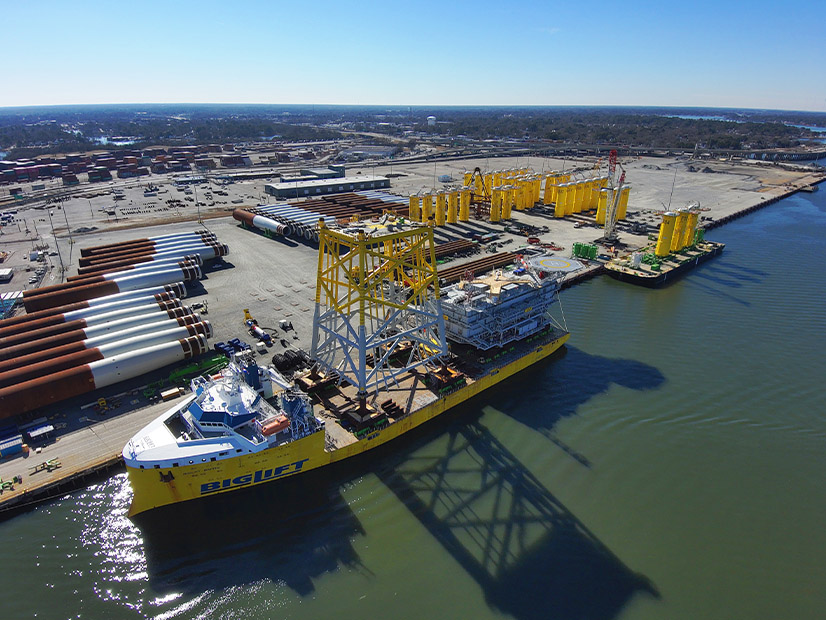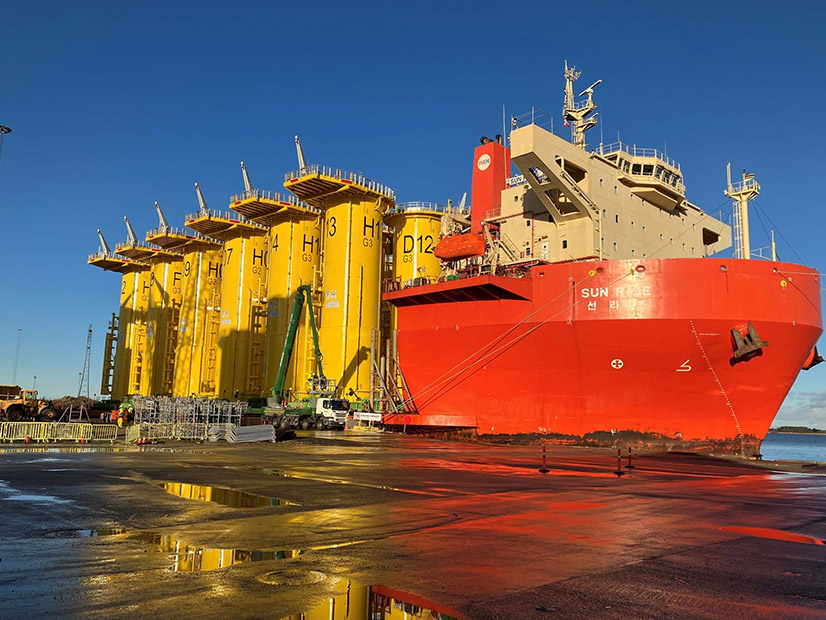
Dominion Energy reported that its Coastal Virginia Offshore Wind project will cost 9% more than initially expected, thanks to higher-than-expected PJM network upgrade costs.
In an update issued Feb. 3, the utility said the largest offshore wind project in the U.S. otherwise is roughly in line with the budget submitted 39 months ago. It is 50% complete and still on track to be commissioned in late 2026.
The project is in a very different situation than most other wind projects off the Northeast coast, which have suffered a litany of delays, cost increases, offtake contract cancellations, pauses on development or even outright cancellations in the past two years.
And as a fully permitted project already under construction, Coastal Virginia Offshore Wind (CVOW) also is not immediately affected by the freeze on offshore wind leasing ordered by President Trump.
In its update, Dominion indicated there were decreases in offshore construction and equipment costs because of currency hedging as well as some increases such as unexploded ordnance removal, undersea cable protection enhancements and transportation fuel.
But these were far eclipsed by the onshore network upgrades and electrical interconnection cost increases.
In its quarterly report submitted Feb. 3 to the Virginia State Corporation Commission (PUR-2024-0026), Dominion said the increase stemmed from the Phase II Study results for Transition Cycle 1 that PJM published in late December.
Based on its conversations with PJM, Dominion expects the network and interconnection costs to be $882 million higher than in the original budget estimate submitted to the SCC in November 2021. The offshore adjustments are expected to raise the price tag by $30 million.
That boosts CVOW’s anticipated total cost from $9.8 billion to $10.7 billion. Part of this will be borne by ratepayers, and part by Dominion and its partner, Stonepeak.
The levelized cost of energy now is projected to be $62/MWh, once $29/MWh in renewable energy credits are factored in. That translates to an expected net impact over project lifetime of $1.01/month for a residential customer using 1,000 kWh/month.
This compares with an average all-in development cost of $150/MWh and a residential ratepayer impact of $2.02/month for Empire Wind and Sunrise Wind, the two mature projects awarded contracts by New York state in 2024.
Empire and Sunrise are among the few offshore wind projects on the East Coast still on track; most others have been canceled, paused or are far off in the future.
What makes CVOW different beyond its sheer size — 2.6 GW, which is 50% more than Empire and Sunrise combined — is that it is being developed by a regulated utility with a regulated return on its investment.
Importantly, Dominion locked in its costs for components and contractors before supply chain constraints, inflation and interest rate hikes wreaked havoc on an industry just starting to gain momentum in the U.S. market.
Dominion is optimistic CVOW’s value proposition will carry it through the latest challenge: election of a president with a longstanding antipathy toward wind turbines, particularly the 800-foot ocean variety.
Trump’s Day 1 executive order freezing new leases does not immediately affect projects that already hold leases — except by creating an uncertainty that can scare away investors who already were looking at a long and uncertain path for cost recovery during the supportive years of the Biden administration.
The order directed “a comprehensive review of the ecological, economic and environmental necessity of terminating or amending any existing wind energy leases, identifying any legal bases for such removal.”
Dominion told RTO Insider in late 2024 that CVOW has enjoyed bipartisan support through multiple state and federal administrations in its yearslong progression from concept to plan to two-turbine pilot project to full-scale steel in the water.
“Bipartisan leaders agree it has been an economic boom for Virginia, creating thousands of jobs and stimulating billions in economic growth, while providing consumers with reliable and affordable energy,” a spokesperson said in December. “Leaders from both parties also agree on the importance of American energy dominance, maintaining our technological superiority and creating good-paying jobs for Americans.”
In its Feb. 3 update, Dominion repeated this message and noted CVOW will advance one of Trump’s stated priorities — dominance in artificial intelligence — by helping power the world’s largest concentration of data centers.




